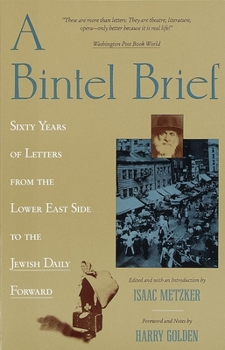A Bintel Brief: Sixty Years of Letters from the Lower East Side to the Jewish Daily Forward
(Book #1 in the A Bintel Brief Series)
Select Format
Select Condition 
Book Overview
For more than eighty years the Jewish Daily Forward's legendary advice column, "A Bintel Brief" ("a bundle of letters") dispensed shrewd, practical, and fair-minded advice to its readers. Created in 1906 to help bewildered Eastern European immigrants learn about their new country, the column also gave them a forum for seeking advice and support in the face of problems ranging from wrenching spiritual dilemmas to petty family squabbles to the sometimes hilarious predicaments that result when Old World meets New. Isaac Metzker's beloved selection of these letters and responses has become for today's readers a remarkable oral record not only of the varied problems of Jewish immigrant life in America but also of the catastrophic events of the first half of our century. Foreword and Notes by Harry Golden
Format:Paperback
Language:English
ISBN:0805209808
ISBN13:9780805209808
Release Date:April 1990
Publisher:Knopf Doubleday Publishing Group
Length:240 Pages
Weight:0.58 lbs.
Dimensions:0.7" x 5.3" x 8.0"
Related Subjects
History Judaism Religion Religion & Spirituality Religious Studies State & Local WorldCustomer Reviews
2 ratings
It was not so easy to become Americans
Published by Thriftbooks.com User , 19 years ago
These letters point to with anguish and humor to the struggles and adjustments of the immigrant Jewish community in America. They go into intimate detail in illustrating the life of a community which would come to contribute so much to American life.
Nice look back at a bygone world, but a bit dated
Published by Thriftbooks.com User , 19 years ago
Overall, this is a fond look back at some of the letters sent to and answered by the editor of the Yiddish-language daily 'Forverts,' dating from the first letters in the Aughts and going till what was the present day at the time this volume was first published, the Sixties. We see over time how attitudes (social, cultural, religious, political, personal, marital) change, and watch as peoples' primary concerns go from runaway husbands, helping relatives to immigrate, American friends laughing at one's intended spouse for being such a greenhorn, unions, having trouble finding work, not earning enough money, and even some seemingly petty problems, like a husband refusing to shave off his beard, which means that he has a harder time finding work and earning money, to more modern concerns like interdating, intermarriage, having an Xmas tree in the house (even though both spouses are Jewish!), having to conceal one's religious identity at work, a young man being upset his peers aren't as religious or in tune with the spirit of the old country as his older relatives are, and a wife who persuaded her husband to buy her a television and now does almost nothing but watch tv. I loved the letters and the responses to them, though as should be expected some of the responses are a bit dated. For example, a mother writes because one of her sons has stopped eating meat, which really concerns her and her husband, and the boy wouldn't even eat meat when they took him to a restaurant to show him that "everyone" eats meat. The editor advised them to take the boy to a psychiatrist to "cure" him of being a vegetarian, although he also ran a response to his response from a member of a national Jewish vegetarian group, pointing out how more and more people were becoming vegetarians and that it doesn't imply there's anything wrong with one or that it makes one less healthy. It's stunning to realise that in 1945 vegetarians were considered practically mentally ill, as well as some of the other responses which were products of their time. However, some of the editorial comments to the letters and responses are dated as well and could use a revised, more modern edition. For example, in the introduction it's pointed out that many of these immigrants of the early 20th century had a lot in common with the hippies and freethinkers "of today," what with their philosophy of free love and radical politics. That "of today" comment dates this edition right off of the bat. There are also some editorial comments about letters concerning interdating and intermarriage (including one on interracial interfaith dating) clearly grounded in the era in which this volume was published; I'm also very much against it, but a lot has changed since the Sixties, and most people intermarry and interdate for different reasons than they did back then, as well as how it's no longer considered that taboo, drastic, and socially unacceptable. Another example is how the editor reflects on one let






